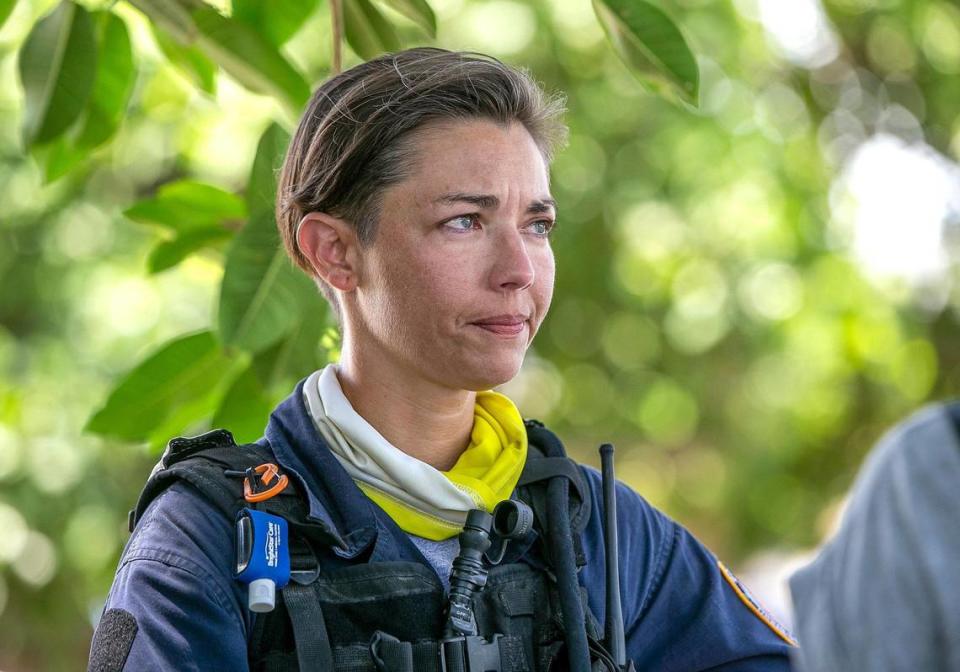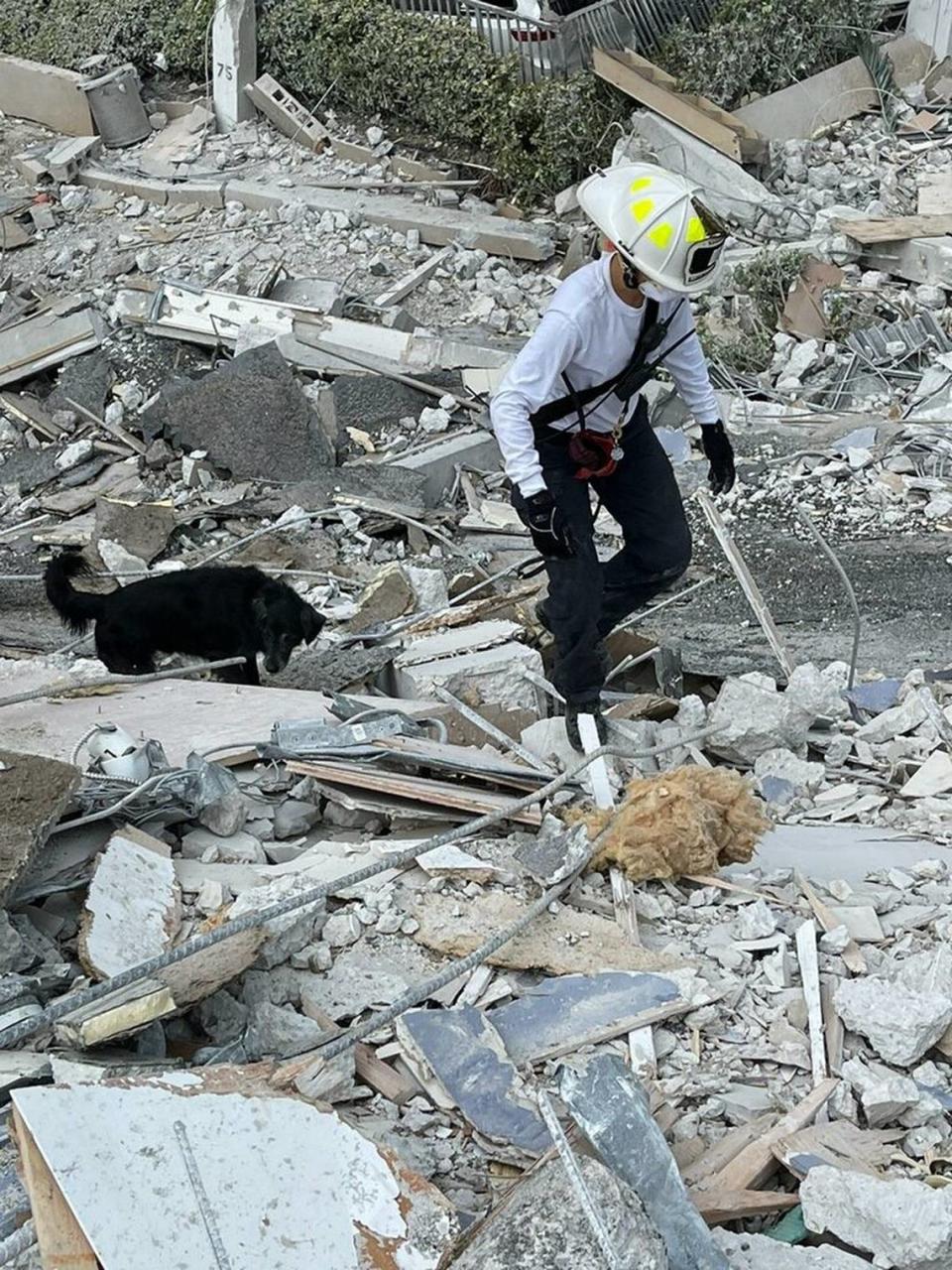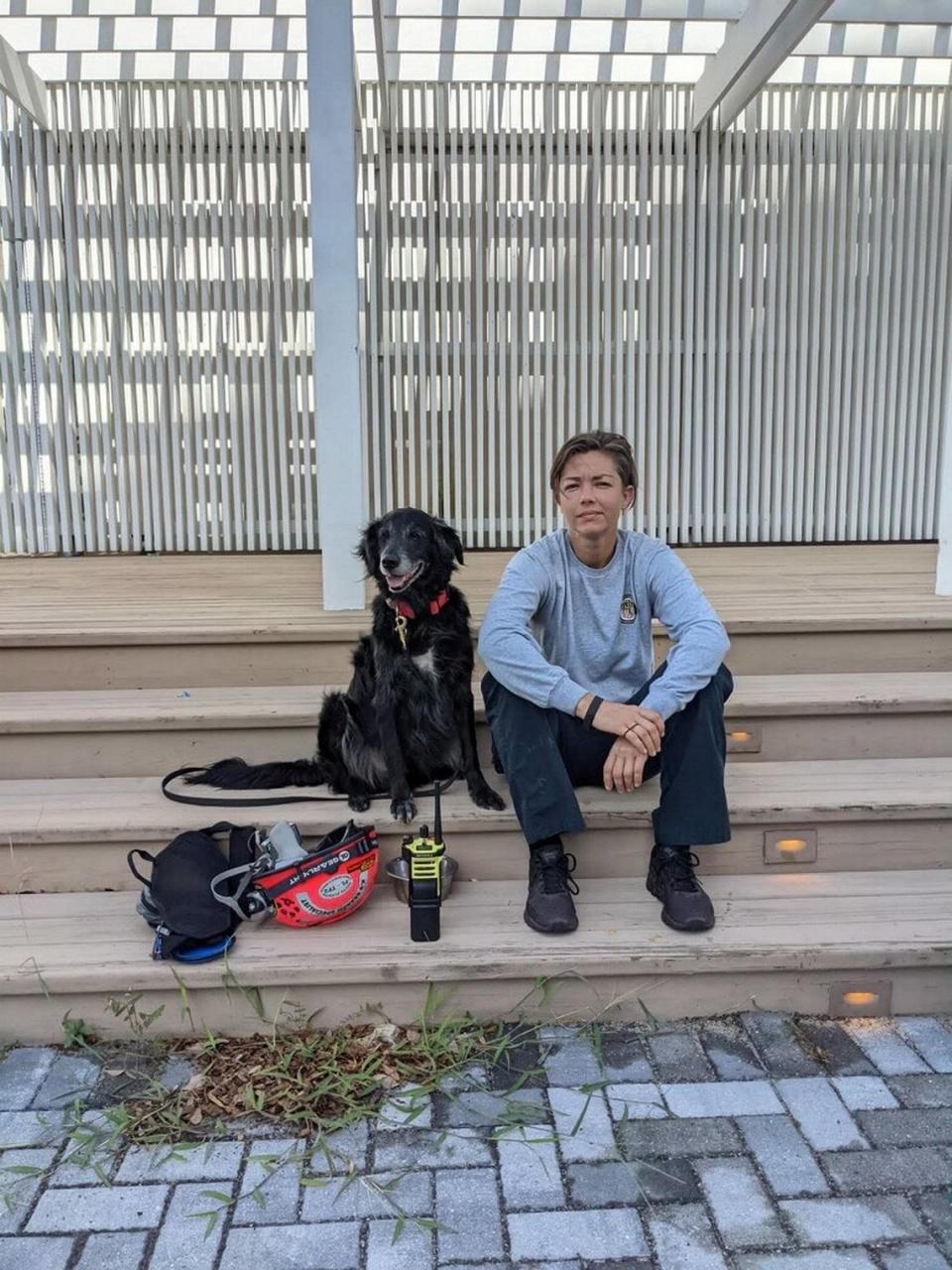Work now, feelings later. For a searcher on the pile in Surfside, some scars may never fade
There will be many scars from the days that Nichole Notte and her dog, Dig, have spent searching the ruins of Champlain Towers South, hoping for signs of life and finding none.
But she knows one moment will haunt her. The recovery of Stella Cattarossi, the 7-year-old daughter of a fellow firefighter who had stood vigil at the site.
“The quietness of the site, all the construction machines shut down, nobody making a sound, no concrete being moved, no metal sounds, nothing. Just the sound of the footsteps of them carrying her away. It’s definitely going to live in my mind forever,” she said.
“Losing a child is hard enough, but digging for your own child is, is… no words.”
Notte, 40, is a veteran of the search and rescue trade. She’s spent 17 years with the Broward Sheriff’s Office and 10 years with Florida Task Force II, the urban search and rescue team.
Responding to disaster is often a difficult business, one that trains searchers to deal with death and suffering. But all her experience wasn’t enough to prepare Notte for what she saw that first morning, when she arrived a mere 45 minutes after the nightmare collapse. It has never gotten easier, with the hope of pulling some miracle from the pile fading daily and now gone. She knows many colleagues who toiled 24/7 on the pile of rubble that once was a condo brimming with life share her feelings. They’re proud of their work but that work has taken an emotional toll — on them, as well as their own families and friends
The Champlain Towers disaster is a global one. Notte and the Florida squads have worked side by side with crews from as close as Palm Beach and as far as Mexico and Israel. But for the hometown rescuers, there has been no opportunity to get on a plane or bus and watch the disaster scene grow small in the window.

Like Stella’s father, many of the local rescuers are looking for people they know. Notte is helping search for her friend’s parents. The personal connection, she said, makes everyone work even harder to find closure for the grieving families.
“That’s my motivation to work, to shove my feelings aside because that’s not what’s important right now. I can always deal with that later, and I think that’s what everybody here does,” she said. “We know we have a job to do and we want to get it done as quickly as we can.”
Despite the chaplains and the grief counselors and the therapy dogs, there are signs that the compartmentalizing many rescuers rely on to get through grim work is fraying.
The other day, Notte was being treated for a cut on her finger that had gotten infected. The slight prick of a needle on her finger, after days of 12-hour shifts that were more like 16-hour shifts searching through concrete for friends of friends, was enough to trigger a crying jag.
“It was like a balloon full of emotions that came out at that point,” she said. “That felt good to let that out.”
Notte said her fellow firefighters have all handled the trauma differently. There are a lot of hugs and small moments of tears in between assignments. There are also nightly gatherings to joke and spend time with each other in the tents after a grueling day.
One light has been the community support. The dog treats and ice cream and empanadas brought in by fellow South Floridians are “10 minutes of happiness” for sweaty workers who’ve just finished sifting people’s most treasured belongings from concrete dust.
Rescuers are also trying to find support at home, where fire families have “changed every part of their lives” to make it easier for their deployed loved ones, Notte said.

She and her wife, Michelle Notte, planned to celebrate their joint June birthdays the Saturday after the collapse. Instead, Michelle found herself thrust into temporary single motherhood with their 3-month-old daughter, Luca. Work at her law firm is piling up, the nanny called out sick and Luca sprung a mysterious rash on her face, all as Nichole was called into the desperate Surfside search.
For Michelle, it was hard to both support her partner while struggling to hold everything together in her absence.
“You do have that guilt of even complaining about anything because the people that lost their family members have it so much worse,” she said. “But the impacts and the pain that this has on the community isn’t mutually exclusive.”
Nichole has only been home a day and a half in the last two weeks. While Michelle was up at night caring for their colicky newborn, Nichole kept waking up with nightmares that she was still going through the rubble.
“It’s tough because I want to help and don’t know how,” Michelle said, her voice breaking.

Her sister has been a firefighter for 20 years, and in that time Michelle has seen little change in how firefighters handle the psychological impacts of dealing with trauma and tragedy. And this one ranks off the scale.
“If they don’t get the mental support they need it affects everyone around them,” she said. “It’s part culture and part survival mode. If they experience one emotion it’s like the dam breaks and they experience all 20 years of their career at once.”
She hopes that this tragedy marks a sea change. That fire departments encourage more individual help for their employees and healthier outlets for their stress.
Nichole agreed. After the last few weeks, she knows she’s got to work on her own recovery.
“We all have it in our soul to help people. Everybody here is a helper. They’re born to help people. They put themselves and their emotions aside and they do it. I think we all handle it in our own way,” she said.

